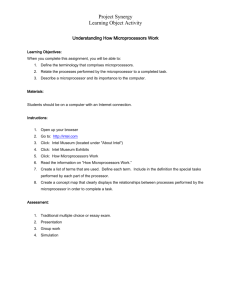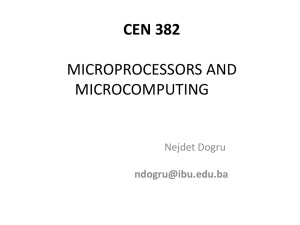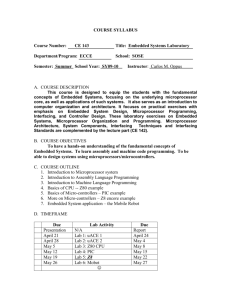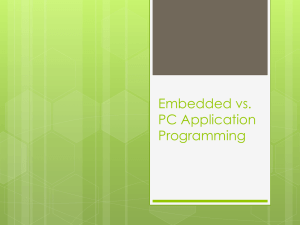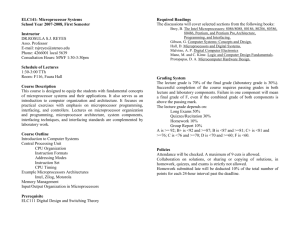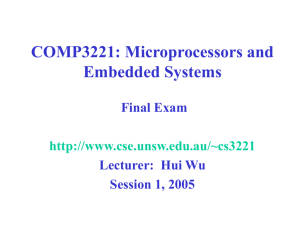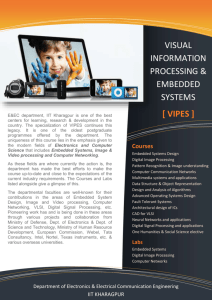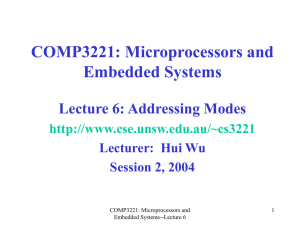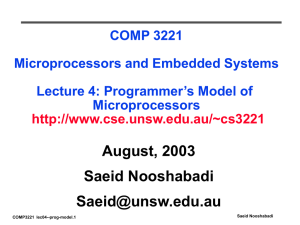COMP3221: Microprocessors and Embedded Systems
advertisement
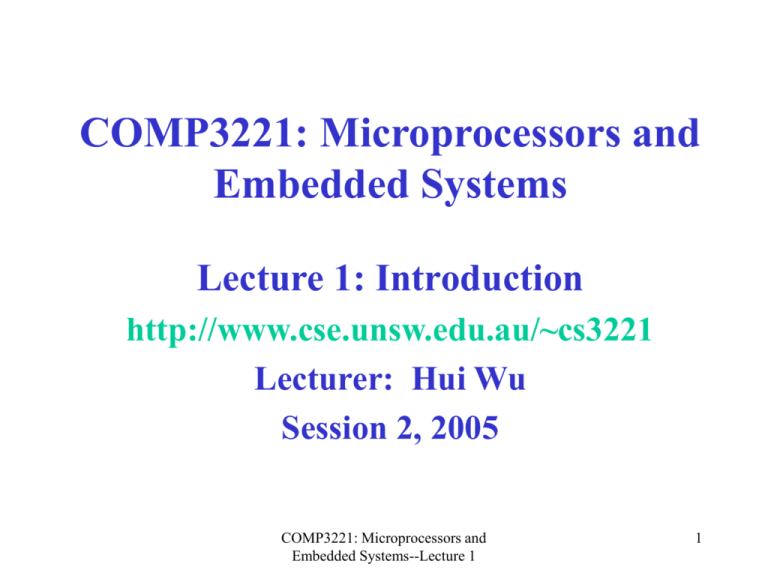
COMP3221: Microprocessors and Embedded Systems Lecture 1: Introduction http://www.cse.unsw.edu.au/~cs3221 Lecturer: Hui Wu Session 2, 2005 COMP3221: Microprocessors and Embedded Systems--Lecture 1 1 COMP 3221 Administration (1/2) Lecturer: Hui Wu: huiw@cse.unsw.edu.au Office: K17-501D Consultation: Wed: 3:00–5:00pm Lecturer In Charge of the Lab: Samir Omar: omar@cse.unsw.edu.au Office: K17-314A For all issues regarding the lab contact Samir COMP3221: Microprocessors and Embedded Systems--Lecture 1 2 COMP 3221 Administration (2/2) Course Homepage: http://www.cse.unsw.edu.au/~cs3221 Course homepage contains: • All Lecture slides presented in the class. • All material related to the Laboratory Exercises. • Pointers to supplementary material. • Announcements. Check it out frequently! COMP3221: Microprocessors and Embedded Systems--Lecture 1 3 Syllabus (1/2) Main Topics: • Instruction Set Architecture (ISA). • Number representation, computer arithmetic. • Assembly and machine language Programming. • Interrupts and I/O interfacing. • Serial communication. • Analog Input and output. • Buses and memory system. COMP3221: Microprocessors and Embedded Systems--Lecture 1 4 Syllabus (2/2) Laboratory exercises: • AVR assembly programming and I/O interfacing. Tools include AVR Studio, AVR board designed by David Johnson. Assignments: • A survey of ARM microprocessor. • A lift controller using AVR. COMP3221: Microprocessors and Embedded Systems--Lecture 1 5 Pre-Requisite (1/2) Digital Circuits (ELEC 1041, COMP 2021) • Number representation, coding, registers, state machines. • Realisation of simple logic circuits. • Integrated circuit technologies. • Designing with MSI components. • Flip-Flops & state machines. • Counters and sequential MSI components. • Register transfer logic. • Bus systems. COMP3221: Microprocessors and Embedded Systems--Lecture 1 6 Pre-requisite (2/2) Computers and Computing (COMP1011 & COMP1021) • The von Neumann model: memory/I-O/processing. • The instruction set and execution cycle. • Registers and address spaces. • An instruction set: operations and addressing modes. • An expanded model of a computer: mass storage and I/O. • The layered model of a computer: from gate- to userlevel. • C- Language Programming. COMP3221: Microprocessors and Embedded Systems--Lecture 1 7 Textbooks -Main references for lecture material – Fredrick M. Cady: Microcontrollers and Microcomputers — Principles of Software and Hardware Engineering. -Additional references – David Patterson and John Hennessy: Computer Organisation & Design: The HW/SW Interface," 2nd Ed 1996. Relevant chapters are, 3, 4 & 8. – Brian Kernighan & Dennis Ritchie: The C Programming Language, 2nd Ed., Prentice Hall, 1988, ISBN:0-13-110362-8. COMP3221: Microprocessors and Embedded Systems--Lecture 1 8 Laboratory Schedule • Monday: 2:00 – 4:00 pm EE233 5:00 – 7:00 pm EE233 • Wednesday: 1:00 – 3:00 pm EE233 • Thursday: 12:00 – 2:00pm EE233 • You will be only allowed to attend the lab session that you are enrolled in. No exception allowed. • Starts in Week 3. Special Open Access labs • TBA • Not assessed. • It is only for those who need a bit of extra time. COMP3221: Microprocessors and Embedded Systems--Lecture 1 9 Enrolment System in Lab Session • Run “sirius” booking system form any CSE lab machine. • Read http://www.cse.unsw.edu.au/%7Ehelpdesk/documentation/Si riusGuideNew.ps as how to run “sirius”. • Any problem with “sirius", contact Mei-Cheng Whale (meicheng@cse). • If you want to work with a partner please make sure that both of you enrol for the same lab session. • You will be paired with a partner randomly if you don’t have one. Students who DO NOT select their Lab sessions will be not be allowed into the lab. COMP3221: Microprocessors and Embedded Systems--Lecture 1 10 Lab Format ° In group of two partners. ° You choose your partner in Sign Up Session (Week 3). It CANNOT be changed later. ° You will get a group account. ° No formal report to hand in. ° You are assessed based on a system of checkpoints. ° An assessors marks your check points. ° Lab Demonstrators help you with the lab. COMP3221: Microprocessors and Embedded Systems--Lecture 1 11 Laboratory Preparation & Catch Up ° You CAN finish the laboratory exercises in the allocated time only if you do the preparation before hand. ° You need to prepare for the laboratory outside the laboratory by: • Carefully reading the lab related documentation • Writing your programs and simulating them at home ° Leaving things to the last minute or walking into the laboratory without preparation may make you fail in this course. ° Go to one of the OPEN ACCESS Sessions if you think you are falling behind. COMP3221: Microprocessors and Embedded Systems--Lecture 1 12 Laboratory Structure & Specifications • 5 experiments. Each experiment consists of several checkpoints. The full mark of each checkpoint is 5. Optional checkpoints give you extra marks. • Each experiment lasts two weeks except Experiment 2 which takes 3 weeks. • Lab specifications are available in the course homepage one week before each experiment starts. COMP3221: Microprocessors and Embedded Systems--Lecture 1 13 Assignments • Two assignments. • The first assignment: A Survey of ARM Microprocessor. • The second assignment: An AVR-Based Lift Controller. • Details to be announced. COMP3221: Microprocessors and Embedded Systems--Lecture 1 14 Course Grading Scheme • Laboratory mark = 25% • Assignment mark = 25% Assignment 1: 10% Assignment 2: 15 % • Final exam mark = 50% Postgraduate students have a different exam paper (not harder, but slightly different scopes). COMP3221: Microprocessors and Embedded Systems--Lecture 1 15 Why Take This Course? • Embedded Systems is a big, fast growing industry (US$ 40 billions in 2000). • Microprocessors/Microcontrollers are the core of embedded systems. COMP3221: Microprocessors and Embedded Systems--Lecture 1 16 What is an Embedded System? • A combination of computer hardware and software, and perhaps additional mechanical or other parts, designed to perform a dedicated function. In some cases, embedded systems are part of a larger system or product, as is the case of an anti-lock braking system in a car. Contrast with general-purpose computer. • Examples range from washing machines, cellular phones to missiles and space shuttles. COMP3221: Microprocessors and Embedded Systems--Lecture 1 17 Microprocessors are everywhere in our life. COMP3221: Microprocessors and Embedded Systems--Lecture 1 18 Why AVR? • RISC architecture with load-store memory access. • two-stage instruction pipelining. • Internal program and data memory • Wide variety of on-chip peripherals (digital I/O, ADC, EEPROM, UART, pulse width modulator (PWM) etc). COMP3221: Microprocessors and Embedded Systems--Lecture 1 19 Microcontrollers vs Microprocessors • A microprocessor is a CPU on a single chip. • If a microprocessor, its associated support circuitry, memory and peripheral I/O components are implemented on a single chip, it is a microcontroller. COMP3221: Microprocessors and Embedded Systems--Lecture 1 20
